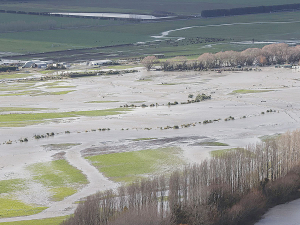Green no more?
OPINION: Your old mate has long dismissed the Greens as wooden bicycle enthusiasts with their heads in the clouds, but it looks like the ‘new Greens’ may actually be hard-nosed pragmatists when it comes to following voters.
 The recent flooding event in Canterbury is an example of where the politicians could have planned to prevent these types of events turning into disasters of this magnitude.
The recent flooding event in Canterbury is an example of where the politicians could have planned to prevent these types of events turning into disasters of this magnitude.
OPINION: I don't doubt the climate is changing as it always has and that all the current policies and plans the politicians want to implement aren't going to fix their concerns.
As usual, we continue to see flooding, weather bombs, fires affecting not only New Zealand but the world.
Why don’t these politicians think how can we support our people, communities, towns cities at the local level to adapt to the ever changing climate?
The recent flooding event in Canterbury is an example of where the politicians could have planned to prevent these types of events turning into disasters of this magnitude.
These flooding events involve extremely heavy, short duration rainfall draining into the rivers that flow through these regions.
Before we constrained the rivers, the braided river systems meandered over these flood plains and deposited materials that built up the areas that we can now use today for urban expansion and food production.
To allow us to develop our communities, we built stop banks to prevent the rivers from naturally changing course.
While doing this instead of looking further ahead and considering the climatic effects, councils/government instead put constraints in place that do not allow adaptation. For example, it’s either not possible or profitable to get resource consent to extract aggregate out of the rivers, so we are seeing the beds of the rivers becoming infilled and in some cases the beds are higher than the land around them.
This natural infilling of the river beds has now become a part of the cause of the flooding from major rainfall events due to the inability of the water to spread over a greater area and dissipate its forces across a much wider area.
What is needed is to have policies and plans put in place to protect the cities, towns and farmland from the effects that weather events are having on us now, and not wait for the future when we will have been forced out of our homes or off the land due to flooding effects.
Recently the chief executive officer of MINEX (extractive industries representative body), Wayne Scott, was shown on television talking about aggregate supplies and he was saying that there is a shortage in the available supply.
A beneficial outcome from allowing the dredging of the river channels is that we get a source of top quality aggregates which urban NZ is built on, whilst also protecting the surrounding land from flooding effects, and we have less of a scar on the environment than from a static quarry site.
The current review of the RMA should include provisions to allow for management of the effects of these weather events by dredging the river channels to ensure the rivers stay within their current banks.
We need good support from central, regional and local government now to allow communities to be able to be safe now, not in 50 to 60 years.
If these agencies allowed common sense to prevail and not let bureaucracy take hold, we might’ve not had the damage that is being done! We should learn from the mistakes of the past and not make the same ones again, apply common sense and use the latest engineering modelling to alleviate these problems.
Peter Buckley is co-chair of Primary Land Users Group (PLUG)
A buoyant farm economy should make for a successful 2026 Southern Field Days, says chairman Steve Henderson.
OPINION: November 7 has been set by Christopher Luxon as ‘E day’ – election day.
The strong wool market has improved in the past six months, despite drops in production over recent years.
On January 5th at Te Pa Station, the World Sheep Shearing Records saw a new nine-hour strong wool ewes shearing record set by Simon Goss.
Recently awarded in the New Years Honours List for Services to Agriculture and Governance, well known dairy farmer Lloyd Downing has become an Officer of the New Zealand Order of Merit (ONZM).
International trade expert Stephen Jacobi says Winston Peters' objections to the Indian free trade deal are "ridiculous".